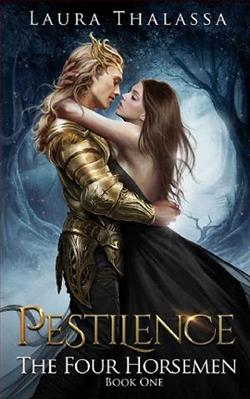Laura Thalassa’s Pestilence is a captivating entry into the realm of apocalyptic romance, a genre that combines the thrill of end-of-the-world stakes with the intimate exploration of human emotions. The novel is the first in the Four Horsemen series, setting the stage for a world teetering on the brink of annihilation, where humanity’s survival hinges on the most unlikely of alliances.
The premise of Pestilence is both intriguing and chilling. The four horsemen—Pestilence, War, Famine, and Death—descend upon Earth with the singular mission to eradicate humanity. Thalassa’s choice to focus on Pestilence, the harbinger of disease, as the first horseman to be explored, is a masterstroke. It taps into a primal fear that resonates deeply, especially in a world that has recently grappled with the realities of pandemics.
The protagonist, Sara Burns, is a firefighter who embodies resilience and determination. Her initial encounter with Pestilence is marked by desperation and courage, as she attempts to assassinate the seemingly invincible horseman to save her town. This act of defiance sets the tone for her character—a woman who is willing to risk everything for the greater good. However, her subsequent capture by Pestilence shifts the narrative from one of pure survival to a complex exploration of morality, empathy, and love.
Thalassa excels in character development, particularly in the dynamic between Sara and Pestilence. Initially, Pestilence is portrayed as a cold, merciless figure, driven by his duty to spread disease. Yet, as the story unfolds, layers of his character are peeled back, revealing a being capable of introspection and change. The evolution of Pestilence from an unyielding force of nature to a more nuanced character is handled with finesse, making his transformation believable and compelling.
The relationship between Sara and Pestilence is the heart of the novel. It is a slow burn, fraught with tension and conflicting emotions. Thalassa navigates the delicate balance between fear and attraction, hatred and understanding, with skill. The progression from captor and captive to something deeper is organic, driven by shared experiences and mutual vulnerability. This transformation is not without its challenges, as Sara grapples with the moral implications of her growing feelings for a being responsible for so much death and suffering.
One of the novel’s strengths is its exploration of themes such as redemption, sacrifice, and the duality of human nature. Thalassa poses thought-provoking questions about the nature of good and evil, and whether love can truly redeem a soul. Sara’s internal struggle is palpable as she confronts these questions, torn between her duty to humanity and her burgeoning love for Pestilence. This thematic depth adds layers to the narrative, elevating it beyond a simple romance.
The world-building in Pestilence is immersive, painting a vivid picture of a world on the edge of collapse. Thalassa’s descriptions of desolate towns, the pervasive fear of disease, and the palpable tension of a society unraveling are evocative and atmospheric. The setting serves as a stark backdrop to the intimate drama unfolding between Sara and Pestilence, highlighting the stakes of their relationship.
In comparison to other apocalyptic romances, such as Susan Ee’s Angelfall series or Amy Bartol’s Premonition series, Pestilence stands out for its unique premise and character-driven narrative. While both Ee and Bartol explore themes of survival and love in the face of supernatural threats, Thalassa’s focus on the horsemen of the apocalypse offers a fresh perspective. Her ability to humanize a figure as traditionally menacing as Pestilence is a testament to her storytelling prowess.
However, the novel is not without its flaws. Some readers may find the pacing uneven, particularly in the middle sections where the focus shifts heavily to the developing romance. Additionally, the resolution of certain plot points may feel rushed or lacking in depth. Despite these minor shortcomings, the emotional payoff and thematic richness of the story more than compensate for any narrative hiccups.
Overall, Pestilence is a compelling start to the Four Horsemen series, offering a blend of romance, action, and philosophical inquiry. Laura Thalassa has crafted a tale that is both entertaining and thought-provoking, inviting readers to ponder the complexities of love and redemption in a world on the brink of destruction. For fans of apocalyptic fiction and romance alike, Pestilence is a must-read that promises to linger in the mind long after the final page is turned.













![The Maid’s Secret Tea Recipe for the Prince [Official]](/upload/pic/manga/the-maid---s-secret-tea-recipe-for-the-prince--official-.jpg)










Reviews 0
Post a Reviews: